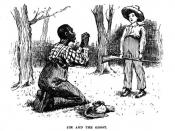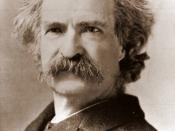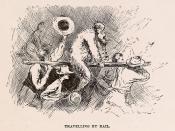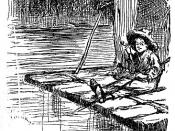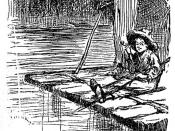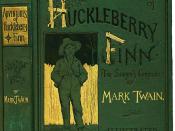Huck Finn In Mark Twain's The Adventures of Huckleberry Finn, the river plays many roles and holds a prominent theme throughout much of the story. Huck and Jim seem to be happiest and most at peace when on the river. Although probably not to the point of having its own personality, the river has a deeper meaning than just water and mud. It provides the two characters a means of escape. Their voyage was a quest for freedom. Although quite constrained in its capacity to provide freedom of movement, the raft affords Huck and Jim a certain amount of freedom in actions, words, and emotions.
Freedom in this book specifically means freedom from society and its imperatives. Huck senses this truth when he mentions how other places feel so cramped and smothery, but a raft don't. You feel mighty free and easy and comfortable on a raft. He resents the objectives and beliefs and the so-called "civilized" people of the society around him.
He disbelieves what societal beliefs have been ingrained in his mind since his birth, which is shown by his close friendship with Jim, a runaway slave. The river is the only form of separation from this society which Huck has access to, but it still does not completely separate them from what they disbelieve in. Although the river allows them some measure of freedom at once, the moment they set foot on Jackson's Island or the raft and although only on the raft do they have a chance to practice that idea of brotherhood to which they are so devoted. This freedom is very limited and they must still go out of their way to avoid others, going down the river only at night and hiding during the day. Huck has to constantly think of new stories to tell nearby boatsmen or anyone else who might intrude on their concord.
Another appeal of the river is its peacefulness. Huck does not much seem to enjoy the company of other people, with the few exceptions of Jim, Tom Sawyer, and a couple of secondary characters such as Mary Jane Wilks. He likes to be free from the restrictions of others and be himself. He also seems to enjoy things quiet, which people do not tend to be. He mentions once when he and Jim anchor and watch the sun rise that there was "not a sound, anywheres -- perfectly still -- just like the whole world was asleep." With just himself and Jim on the raft, things surely would tend to be quiet more often than not because two people eventually run out of things to talk about, as opposed to the many mixed conversations of large company. He likes these quiet moments, which possibly last even days at a time, because at one point Huck says, "Two or three days and nights went by; I reckon I might say they swum by, they slid along so quiet and smooth and lovely." (96) This level of peace and appreciation of the quiet was an acquired taste and strengthens every time they return from an episode on the shore. Huck, however, did not always enjoy being on the raft and did not always appreciate its serenity.
When they first set out on the raft and leave Jackson's Island behind, Huck says, "It was kind of solemn, drifting down the big still river, laying on our backs looking up at the stars, and we didn't ever feel like talking loud, and it warn't often that we laughed, only a little kind of a low chuckle." (55) However, the more they venture onto shore, the more they appreciate being back on the raft. Huck becomes more attached to the raft and his companion every time he returns to the peacefulness and harmony of the raft, and at one point says that "it did feel so good to be free again and all by ourselves on the big river and nobody to bother us." (162) He enjoys not only the fact that he is in a way cut off from society, but he becomes somewhat detached from it, not realizing that he is in it at times. This is evidenced when Huck mentions that "sometimes they'd have that whole river all to themselves for the longest time." (97) Huck becomes so engrossed in the good moments that he forgets how they have to constantly be on the watch for others on the river.
The river does hold some higher role than just water and mud; it is the center for most of the story. In contrast to the river's peaceful qualities and possible moral interpretations, the river is also a source of danger, and the threat is ever-present. There is the threat of the raft being torn apart during storms. Thunderstorms on the river were particularly severe -- capable of breaking away at the shore and carrying away an entire "two-story house, and tilting it over, considerable" (44) -- and this threat was multiplied by the simple fact that they were on a small raft. After the storm and fog in which Huck and Jim were separated, Huck returns to find the raft to find it with one of the steering oars smashed off, "and the raft was littered up with leaves and branches and dirt. [It'd] had a rough time." (70) Also, if the raft was too far to the middle of the river, it was in danger of being crushed by waves and damaged by debris; if it was too close to shore, it could be thrown into the shore, completely destroying it, or penned against a large rock like the ship with the murderers on it. There was also the threat of Huck and Jim losing sight of one another because he said you couldn't see twenty yards in the fog and being separated from each other for good.
Then there was the threat of larger boats: if they ventured too far into the middle of the river and the oncoming boat did not see them, they could be smashed by the larger boat such as the steamboat that "came smashing right through the raft" (78) immediately prior to the Grangerford episode. There was also, of course, the chance that someone would see Jim and "try to take him away from Huck to return him to slavery. So they had to cover up the raft during the day and run only nights because at night "they don't bother them." (103) So, even as the river provided peace, freedom, and escape, its presence loomed ominously throughout the journey. For Huck and Jim, the benefits of their detachment from land society and its evils seems to greatly outweigh the perils of remaining on the river. The river is where the two find their ultimate salvation.
My relationship with the river is not as close and complex as Huck is with the Mississippi. The river makes a big impact on the city of Casper. Not only is it the reason that the city originated here, but also it is the source of one of the biggest necessities of living, water. If it were not for the river there would not be any non-expensive and practical means of supplying water for the city. If a town does not have water then it can not flourish.
The entire reason that the city of Casper was originated here is due to the Platte River Station, also known as Fort Casper. It was built to help settlers moving west to cross the river without all of the hazards and dangers that would normally be involved. When people started to settle near the station it eventually evolved into the City of Casper. They settled near the station because not only would that provide a source of protection but also this is a very resourceful place with a mountain to the south and a river to the north.
How the river influences me is not directly but how it effects the things that influence my life. For an example since it allows the means for a large amount of vegetation to grow, it gives me a place to have my paintball games. It provides the ideal settings for a game. If the river was not here then the vegetation would not grow which would cause me to have to find a different place to play.
Another way that the river could effect me is if the river were to flood. Since my house is only a little over 200 feet away, any flooding could affect me. It could raise the water table that in turn would flood the basements in my neighborhood. Since the water table is a reliable resource in my area, it provides means of using that water instead of city water to water our lawns and for other outdoor activities.
The river does not and hopefully will not affect my life as much as it did with Huck. I really do not interact with the river that much. Other than providing resources for the city, the direct effect does not have influence with me. But if you look at the things that effect us that are effected by the river is almost unthinkable. Overall the river is the basis of the town.
